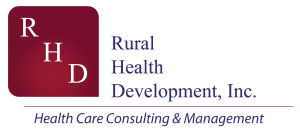Rural Health Clinics
- Rural Health Feasibility Studies
- RHC Certifications
- Independent RHC Cost Reports
RHD has assisted over 350 clinics across the country in becoming an Independent or a Provider Based Rural Health Clinic. We do cost reports for the IRHCs in all regions within each of the various Fiscal Intermediaries. Personnel are available for clinic operational analysis whether it is a fee-for-service or an RHC. Workshops or seminars, to include topics such as billing, coding, documentation, management strategies for RHCs or perhaps cost reporting fundamentals, that your community would like presented are also part of our services. Personnel are available by phone to answer your questions.
Nurse Consulting
Our “Mock Survey” is an excellent tool to help your community become compliant to State and Federal Regulations, as well as save you thousands of dollars in fines and penalties which could be imposed in the event of an unfavorable survey.
Operational Analysis
An analysis of each department by professionals and suggestions for implementing adjustments that will result in greater efficiency for personnel, equipment and resources.
- Accounting and Bookkeeping
- Accounts Receivable & Collections
- Administration
- Benchmarking
- Billing
- Budget and Financial Reporting
- Chargemaster
- Coding
- Community Relations
- Corporate Compliance
- Medical Records
- Patient and Resident Care
- Pharmacy
- Physical Plant
- Programs and Activities
- Professional and Technical Staff
- Quality Assurance
- Staffing Levels
Reimbursement Maximization
Maximizing third party reimbursement is essential. Our firm is known and respected as an expert in this field. Please call for a no cost, no obligation consultation. One of our professionals will be happy to visit with you at your convenience.
Strategic Planning
We can help your health system develop and implement a strategic plan for the current and future health needs of your community. Go from surviving to thriving with the RHD team!
- Identify Health Needs
- Analyze: Strengths, Weaknesses, Opportunities, and Threats
- Set Goals
- Create an Action Plan
- Place the Plan in Motion
RHD Inservices:
Dietary and Nutrition
Environmental Services
HIPAA Specialists
Know the Regulations
Nursing Leadership and Staffing
Surviving A Survey
Dietary and Nutrition:
Dietary Regulations
Regulations affecting the dietary department
New survey protocols
Documentation needed to prevent deficiency and to ensure proper nutritional needs for residents.
Weight loss / Dehydration / Nutritional Risks
New survey protocols including the WHP group (weight loss, hydration, pressure sores)
Residents at nutritional risk
Documentation and care that should be provided
Hydration
Risk factors
Documentation needed
Compliance hints
Dining Room Experience
New survey protocols
How to set up a dining room enhancement committee to meet the residents’ needs
Environmental Services:
Maintenance Department
Regulations affecting the maintenance department
Documentation needed to fly through surveys
Housekeeping Department
Regulations affecting the housekeeping department
Documentation needed to soar through surveys
Infection Control
Infection Control regulations
Documentation needed to ensure proper infection control techniques are being followed in the facility
Safety / Restraints – Chemical & Physical
Review restraint regulations
How to recognize potential restraints
Review the importance of assessments and documentation in restraint use in affording residents the proper care
HIPAA Specialists:
Insuring your facility is compliant with the new HIPAA regulations is essential. Our personnel can assist you through the process of implementation and providing the tools to assure compliance in the new health information privacy regulations. Please call to see what RHD can do for your facility.
Know the Regulations… and how to comply:
We have experts who can help your employees have a better understanding in each of these areas with the result of a better quality of care to your residents.
Activities
Activities regulations
Documentation needed
How to assess residents’ Activity needs
Activities’ role in MDS / Resident Care
Consumer Satisfaction
Importance of consumer satisfaction
Techniques for achieving greater consumer satisfaction
Documentation
The importance of documentation in the liability of the facility
How documentation should support the care given
HIPAA Implementation Education & Tool
The importance of compliance with regulations
What steps to take to implement HIPAA within your facility
MDS/CAAs/Care Planning
Importance of the accuracy of RAI process
How to write a Resident centered careplan
Importance of documentation as a corporate compliance issue
Medications
Adverse Drug Reactions / Medications Administration Review
The Beers List and documentation needed to support use of medication on the list
How surveyors are reviewing medication administration and medication errors
How to reduce psychotropic drug use and document appropriate use
Medication Aide Responsibility
Pain Management
How to set up a program
Documentation needed
Pressure Sores
New Survey protocols
Review regulations concerning pressure sores
Documentation needed
Interventions to prevent pressure sores
Description of avoidable and unavoidable pressure sores
Quality Assurance
Review Quality Assurance regulations
How to strengthen your Quality Assurance Program
The role committee plays in facility
Restorative Nursing: Bowel / Bladder, Dining Room, ADL’s
Review regulations, clinical indicators and how surveyors review this process
What restorative nursing can offer
Skilled Nursing Facility Implementation
Skilled Nursing Facility regulations
Documentation needed to ensure skilled services are warranted
How to bill for Skilled Nursing Services to Medicare Part A and Medicare Part B
Social Services
Social service regulations
Documentation needed to ensure the psychosocial needs of the resident are being met.
Social Service’s role in MDS / Care.
Swing Bed Regulations and Documentation
Who qualifies
Documentation needed
The Three D’s: Delirium, Depression, Dementia
How to assess and differentiate between the D’s
Review care and how to care plan for the D’s
Understanding Dementia Care
Discuss the seven stages of dementia
Learn dementia care techniques
Review care plans and behavior management for each stage
Nursing Leadership and Staffing:
We offer in-services to fit every employee in your facility – from Managers to Aides – everyone is important and everyone has a role and a responsibility in the care of the resident!
Director of Nursing
Leadership
Role responsibilities
Charge Nurses
Duties of the charge nurse
Importance of being a leader
Empowering the Nursing Assistant
Importance of the Nursing Assistant as a vital part of the team
How the Nursing Assistant’s care impacts the resident/survey process
Staff Competency / Evaluations
Importance of doing staff competency evaluations
When to do them
Staff Development
What is staff development
Importance of staff development
Abuse Regulations
New survey regulations reviewed
How to perform an investigation
Surviving a Survey:
Know what to expect and how to prepare for a State and Federal Survey.
“Mock” Survey – for Hospital, Swing Bed, Nursing Home (NF or SNF), Assisted Living
Our qualified consultants look at all areas of your facility and make an assessment in terms of compliance to the regulations and give you a report of the results, along with recommendations on how to correct problem areas.
Survey for “Critical Access Hospital” designation
Understanding Level 1 and Level 2 of the survey process
Mandatory tasks
Critical Care Areas
The New Survey Process for Long Term Care
Investigation Protocols of the new survey process, including: Abuse, Weight Loss, Dining Room, Pressure Sores, Hydration, Staffing, and Adverse Drug Reactions.
Surveyors are mandated to review Quality Indicators over 75% as well.
The Seven Survey Tasks:
Off-Site Survey Preparation
Entrance conference – on site
Initial Tour
Sample Selection
Information Gathering
Information Analysis for deficiency determination
Exit Conference
Sentinel Events
The three Sentinel events: pressure sores, fecal impaction, dehydration
How to ensure events don’t occur and if they do, the documentation needed and care provided.
Quality Indicators links Care
Review the 24 quality indicators and how their use can impact resident care
Review how the quality indicators impact the survey process
Complaint / EMTALA : Emergency Medical Treatment Active Labor Act
EMTALA regulations
How to comply
Risk Management
Regulations for Kansas or Nebraska
Help in setting up your program
Setting policies for your facility
Documentation needed
Reporting requirements
6:45 AM | Thursday Aug 7, 2014
The Adult Swim Club provides experienced instruction and workout designs to the Breckenridge swimming community. Swimmers receive hands-on instruction from Pro-Triathlete and USA Swim Coach Jaime Brede. Jaime guides individuals and groups through various workouts that increase endurance and fine tune stroke techniques while developing a team atmosphere conducive to improving performance. The Breckenridge Recreation Adult Swim Club is for intermediate and advanced swimmers only. $5 drop-in fee does not include Recreation Center daily admission. Please pay fee at Front Desk upon arrival. Please call the Aquatics Coordinator with any questions at 970-547-4338. Dates: Session 1: June 3-July 10 Session 2: July 15-August 21 Days: Tuesdays & Thursdays Times: 6:45-8:15am Ages 16 & Up
Admission: $5
10:00 AM | Thursday Aug 7, 2014
Looking for an expert to teach you about the flora and fauna of our forests? Want to learn about the natural or cultural history of our beautiful mountain paradise? Then join our professional guides on our weekly hikes throughout the Breckenridge backcountry. From easy to difficult, these hikes entice your senses and teach you all you ever wanted to know about our high alpine home. Be sure to dress for the weather and anticipate thunderstorms. Bring water, rain jacket, sunscreen, and hiking boots or shoes. No dogs allowed. All ages welcome. Children under 4 must be in a carrying pack. August 7: Cucumber Gulch: Fragile Ecosystems (Easy)
5:00 PM | Thursday Aug 7, 2014
Come and join us on a walking tour of Breckenridge and learn the strange but true stories of the modern day town. Hear about disappearances, suspected kidnappings, murder and explosions!
$15 A $10 C
Admission: $10-$15
Free Summer Thursdays – Concert in the Park Series
5:30 PM | Thursday Aug 7, 2014
The Frisco Concerts in the Park will return for 2014! Thanks to all who came out to support local non-profit organizations and amazing music in summer of 2013. The Town of Frisco is proud to bring together great music for a great cause at the FREE Outdoor Concert in the Park Series at the Historic Park Gazebo & Lawn at 120 Main Street. The concerts usually feature some of the hottest up-and-coming musical talent and are ready to get you moving to the beat in the mountains!
Admission: Free
7:30 PM | Thursday Aug 7, 2014
Lampooning the hallowed Arthurian legend, Monty Python’s Spamalot details in irreverent fashion the story of England’s King Arthur and his Knights of the Round Table and how they might have come to be.
Admission: $23-$32
8:00 PM | Thursday Aug 7, 2014
Tonight we’re featuring the best in local and Colorado musicians – come out and enjoy this free show!
Admission: Free
8:00 PM | Thursday Aug 7, 2014
Thursday is Reggae night and once again, Loaded Joe’s is the place to be. Join DJ Weez and the Black Lion as they bring a different beat to the valley. Every Thursday night this is the place to be!
Admission: Free
Rural Health Development was founded in 1990 for the sole purpose of helping communities and providers meet the health care needs of their citizens and patients.
Whether you are looking for consulting services or a full management contract for your community, we have the expertise and are ready to help. We can personally relate to the challenges facing rural America today. Opportunities do exist and our team will assist in achieving maximum results.
The Health Care business can be confusing, but you don’t have to go down this road alone.
The prevention of tooth decay
and gum disease helps ensure a healthier
life for your elder. Weight loss and
pneumonia can result from these conditions
so good oral care and assessments
are very important, but sometimes
may be difficult.
Providing mouth care and performing
oral assessments for elders
with dementia requires patience and
time. Here are a few helpful hints that
should make it easier for the elder and
the caregiver:
• Relax: when the caregiver is relaxed
the elder relaxes enough for you to
lift up the lips to look inside the
mouth or insert the toothbrush. Let
the elder lead. Tell the elder what you
are going to do then ask the elder to
allow you to move forward.
• Project nonverbal confidence: Smile
and use light touch to encourage the
elder to cooperate. Establish and
keep eye contact at the elder’s level.
• Choose your words carefully: Use
short phrases that sound helpful
avoiding orders. Use a calm and
friendly voice, but a firm voice.
• Keep it simple: Only one instruction
at a time and no multiple steps all
at once.
• Give choices: Offer choices but
make sure choices lead to completing
the mouth care or assessment.
Osteoarthritis (OA) is the most common
form of arthritis affecting nearly 27 million
people in the United States. Cartilage and
bone damage that occur in OA can lead to
pain, stiffness, swelling and difficulty using
that joint. In normal joints, a firm rubbery
material called cartilage covers the end of
each bone. Cartilage provides a smooth,
gliding surface fir joint motion and acts as
a cushion between the bones. In OA, this
cartilage breaks down, leading to symptoms
such as pain and swelling and problems
using the joint.
Causes of OA include heredity, being overweight,
joint injury, repeated overuse,
nerve damage, aging, removal of the meniscus
from the know and growth patterns
such as bowed legs. To help keep your
joints healthy, reduce or prevent pain and
retain your independence, it is important
maintain muscle strength and a healthy
weight.
If you think you have OA see you physician
or rheumatologist. Managing your OA
may include regular physical exercise in
the form of stretching (Tai Chi), aerobatic
activity (walking, water exercises, riding a
stationary bike)and strengthening exercises
as well as weight control, therapy,
medications to treat pain and reduce inflammation
and nutritional supplements
(glucosamine and chondroitin sulfate).
Reference: “Osteoarthritis Understanding
OA—From Prevention to Causes and Treatments”,
Arthritis Foundation.
Although Mother Nature
does not seem to be aware that
spring is officially here, by the calendar
it arrived a month ago. There
will be lovely days to take our elders
outside to enjoy the emerging
spring flowers and trees. We often
take for granted our time outdoors,
but our elders don’t always
have the opportunity to enjoy this
privilege because they rely on staff
to take them outside.
Being outside was a way of
life as many of them lived on farms
and ranches or grew flowers and
planted gardens. It’s very important
to incorporate daily outdoor
time in their routines. Take your
activities outside. Exercise groups
and walking can be done outside.
Enjoying the fresh air, listening to
the birds singing, and feeling the
sunshine is not only good for the
soul it helps in the natural production
of vitamin D. Make time, take
time. Happy spring!
This season GI illnesses have
been extra virulent. Norovirus and
other strains of GI flu can leave you
in a weakened condition in a short
amount of time. The “BRAT” diet
will give your bowel a rest as you recover.
This simple diet consists of
four items:
• Bananas
• Rice
• Applesauce
• Tea
To prevent spreading the illness, remember
good handwashing, always
closing the toilet seat before flushing,
and disinfecting with a 10% bleach
solution or hydrogen peroxide. Hydrogen
peroxide is less damaging to
clothing and other items than bleach
is but it is still every bit as effective.
Norovirus and Influenza are
at a high rates this time of year. The
single most important preventive
measure to reduce spreading germs
and getting sick is good handwashing.
CDC Guidelines for good handwashing
are as follows:
When should you wash your hands?
• Before, during, and after preparing
food
• Before eating food
• Before and after caring for
someone who is sick
• Before and after treating a cut
or wound
• After using the toilet
• After changing diapers or cleaning
up a child who has used the
toilet
• After blowing your nose, coughing,
or sneezing
• After touching an animal or
animal waste
• After handling pet food or pet
treats
• After touching
garbage
What is the right way to wash your
hands?
• Wet your hands with clean, running
water (warm or cold) and
apply soap.
• Rub your hands together to
make a lather and scrub them
well; be sure to scrub the backs
of your hands, between your
fingers, and under your nails.
• Continue rubbing your hands
for at least 20 seconds. Need a
timer? Hum the “Happy Birthday”
song from beginning to
end twice.
• Rinse your hands well under
running water.
• Dry your hands using a clean
towel or air dry them.
• If you do feel ill it is very important
you stay home until symptoms
subside so you do not expose
others to your germs.





